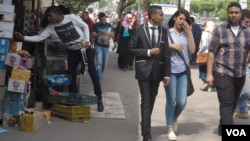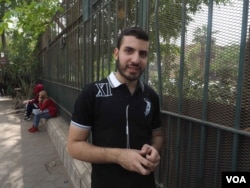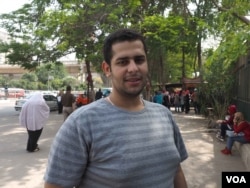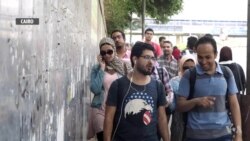Hamada Elrasam contributed from Cairo, and Heather Murdock contributed from Jeddah, Saudi Arabia.
Five years ago, Arab youth took to the streets in a bid for democracy. Today, only a small segment of youth believe those uprisings made their world a better place. But that does not mean they have given up on change.
This is among the findings of the eighth annual ASDA’A Burson-Marsteller (ABM) Arab Youth Survey, which gauges the views of Arab men and women between 18 and 24.
In a similar poll taken at the start of the 2011 revolutions, the overwhelming majority of youth named “democracy” as their top priority. Today, facing a breakdown of governments, the war in Syria, the rise of the Islamic State group and ever-widening sectarianism, priorities have shifted.
The poll shows that while 22 percent believe the lack of democracy is one of the region’s biggest obstacles, the majority (53 percent) favors promoting stability over democracy.
“They would rather work to reform the systems within which they live,” Michael Stephens, research fellow for Middle East studies at the Royal United Services Institute in London, told VOA via Twitter, “than completely collapse what exists and rebuild it with empty slogans.”
But the basic message of youth hasn’t changed since the start of the revolutions, and leaders should take heed, said Stephens.
Little support for Daesh
Perhaps the most heartening news is that most Arab youth are not impressed by IS. The overwhelming majority of youth (77 percent) are worried about its rise, and a similar number say the terror group is doomed to fail.
Nearly four out of five say they wouldn’t support IS even if it were less violent.
A quarter say joblessness is the top reason IS (called Daesh in the survey) is able to attract recruits from the region. Only 9 percent believe that “glory” and the desire to be recognized as a “hero” motivate recruits.
Youth are the largest demographic in the Middle East, but young people face higher unemployment than their counterparts elsewhere.
In keeping with these statistics, fewer than half of the survey’s respondents (44 percent) reported good job opportunities in their countries.
“I was particularly struck by the importance of bread-and-butter issues,” said Faisal al Yafai, a leading commentator from the United Arab Emirates, “political issues that every government in the world is dealing with, and the Arab world is no exception. Around 200 million jobs will need to be created in the coming years and decades in the Arab world. This will be a far harder task that eradicating Daesh.”
Job prospects are grimmer for young women; nearly 40 percent of women in Egypt, Iran, Jordan, Lebanon, Libya, Tunisia and Yemen are jobless. But not all women are discouraged.
“I think we are evolving as a country,” said Lina Al-Maenna, co-founder and director of Jeddah United, a Saudi company that promotes sports among men and women.
“Women recently have just become official members in the Shura Council, which is the highest consultative council in the country. The political power here for the women in the country is definitely evolving. It is really happening as we speak now. History is really happening,” she said.
In all, attitudes toward religion seem to be shifting in the region. Overall, more than half said religion plays too much of a role in the Middle East and nearly three-quarters (72 percent) said Sunni–Shi’ite sectarianism fuels the region’s unrest — significantly more (88 percent) in Yemen, where Shi’ite Iran and Sunni Saudi Arabia are fighting a proxy war.
Rising Iran influence
The biggest surprise, said ABM, is that for the first time, Iran ranks among the region’s top 10 allies. Thirteen percent named Iran as their country’s biggest ally, mainly in countries where Tehran’s influence is strongest — Iraq, Lebanon and the Palestinian territories.
“I think it's very clear that there are definable differences between the Levant and the Gulf in how they perceive the role of Iran, and the problems of the conflicts that have beset the region,” said Stephens.
WATCH: Arab Youth Haven't Given Up on Change
Youth are divided over the Iran nuclear deal, which finds greatest support (93 percent) in Oman.
Nearly a third of all youth surveyed named Saudi Arabia as their country’s biggest ally, while a quarter named the U.S. as their country’s biggest ally — lower than last year but significantly higher than in previous years.
Improved view of U.S.
Perceptions of the U.S. are stronger among Gulf states, where 85 percent name it as an ally.
“It is seen as an economic ally,” said Saudi journalist and political commentator Khaled Almaeena. “It has helped countries in distress.”
The U.S. is not perceived very well in Iraq, where 93 percent see it as an “enemy.” Eighty-two percent of Yemeni youth share that opinion, as do 81 percent of Palestinian youths.
In other interesting findings, Arab youth aren’t sure how to view the Syrian conflict. Thirty-nine percent view it as a proxy war between regional and world players; 29 percent see it as a revolution against the regime; and 22 percent call it a civil war. Ten percent say they simply don’t know.
Almaeena suggests the numbers reflect growing indifference to political crises.
“Basically, youth are more interested in job security and education than in conflicts,” he said.
More Arab youth report they get their news from television, though the internet and social media are fast catching up. Fewer than two in 10 say they get their news from traditional print media and radio, and only 6 percent from magazines.
Takeaways
So what can be taken away from the survey?
“Life is full of problems,” a law student in Cairo told VOA, citing unemployment, the Egyptian military and a tangled government bureaucracy. "We are way, way behind many countries that were established after us, and they moved ahead of us.”
The survey demonstrates that youthful optimism has been dented in the past five years, but not squashed.
"That the promise and ambition of the Arab Spring has not been fulfilled yet does not mean, I hope, that it will not be fulfilled in time,” commentator Yafai said as the study was released, and he offered a message to the region’s leaders:
“If the young people of your countries do not believe that they are better off five years after the Arab Spring, that is not the fault of the young for believing. It is the fault of the political establishment for not achieving.”









